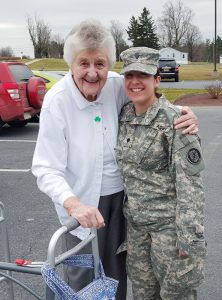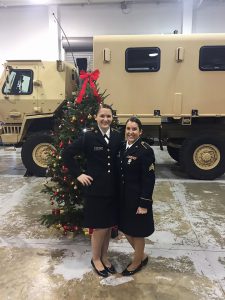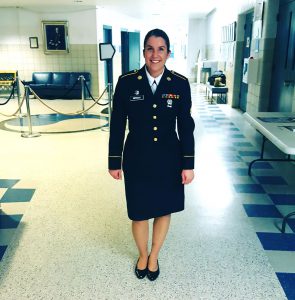Life’s precious moments
Written by Staff Sgt. Michael Smith, 374th Airlift Wing
Bzzt Bzzzt! Bzzt Bzzzt! Sitting in a hand-me-down chair, feet inches from the floor, a red-haired soldier searches for her vibrating phone under piles of paperwork. Discovering the phone under a few Starbucks napkins, her piercing blue eyes widen as she recognized a familiar name.
Upon answering the call her alluring smile quickly fades into a solemn grimace. Without saying a word, she inexpressively makes her way for the exit, drawing attention from her inquisitive coworkers.
In complete disregard to the speed limit the then specialist now Sgt. Aubrey Mitsch, a health care specialist in the 104th Area Support Medical Company, drove 135 miles to do what she does best – putting others before herself.

Spc. Aubrey Mitsch, a health care specialist in the 104th Area Support Medical Company, embraces Aunt Sue while attending her Basic Leader Course.
“My mom told me that my Aunt Sue had two strokes and a seizure,” said Mitsch shakily before pausing to hold back tears. “They found her unconscious laying in her own vomit and rushed her to the emergency room.”
According to Mitsch, she is the black sheep of the family and looks to her Aunt as a second mother who plays the role of her cheerleader when life gets her down.
“I found her in the hospital and it was so hard to see her like that,” said Mitsch blinking profusely to stop herself from crying. “She looked like a lost frail old lady and the life was just gone from her.”
Pulling her phone from her pocket, Mitsch displayed photos from her trip and mentioned that the only clothes she took during the hospital visit was the uniform she had on.
“I hadnʼt eaten all day, I felt pretty crappy,” said Mitsch. “But it wasnʼt about me, it was about her.”
According to Mitsch, during the initial six-hour emergency room stay, she was eventually able to bring her aunts spirts up and get her back to her light-hearted self.
“She [Aunt Sue] started to hit on the doctors,” said Mitsch while cracking a smile. “She then started telling me I needed to get married and to start having babies soon before time runs out.”
Being the only family member in the area, Mitsch stepped up and became the point of contact for the hospital staff; relaying updates and briefing her aunts medical history to doctors.
“It was pretty hard dealing with all of it alone,” said Mitsch as she fiddled with her watch. “Sometimes you just want a hug or someone to tell you it’s ok.”
The next day, after being moved to the stroke unit, Aunt Sueʼs mental state took a turn for the worse.
“She looked to me and said ‘I just want to dieʼ,” said Mitsch while looking out the window, wiping tears from her face. “I never felt more sad in my life knowing that there was nothing I could do for her.”
Moving from New Hampshire to Maryland in 2010 without her family, Mitsch mentioned that she often feels alone; but that it helps knowing that her aunt was close enough to visit and console her.

The recently promoted Sgt. Aubrey Mitsch, a health care specialist in the 104th Area Support Medical Company, poses with Cadet Abby Phillips during a unit holiday gathering.
“I told her it was ok for her to die, even though I wanted her to stay with me,” said Mitsch, tears streamed down her freckled cheeks. “But, I just wanted her to be happy. So I called everyone in my family so they could say their goodbyes.”
With tears steadily flowing from her now blood shot eyes, Mitschʼs mood suddenly shifted, as if a jolt of electricity ran through her body.
“After talking and praying with the chaplain she fell asleep, so I went to grab some lunch,” said Mitsch, slowly beginning to smirk. “When I came back she had done a complete 180. She said she had a dream that she had died and now she wanted to live. I was just dumbfounded. How does someone go from declining medical attention to not wanting to die? It was so emotionally draining.”
According to Mitsch, after Aunt Sueʼs epiphany, her warm friendly aura quickly returned. Back to her normal self, but still lacking full mobility, she was moved from the stroke unit to rehabilitation wing.
“It was great being able to see her smile and laugh again,” said Mitsch with a gleaming face free of tears. “I wanted to spend more time with her, but she kept telling me to go have fun and enjoy my life.”
After five days of providing around the clock medical care and sleeping in a chair next to her aunt’s bed, Mitsch, obeying the speed limit, drove back the same 135 miles to her guard duties in Maryland; continuing to put the needs of others first.
This article was started June 13, 2016.

